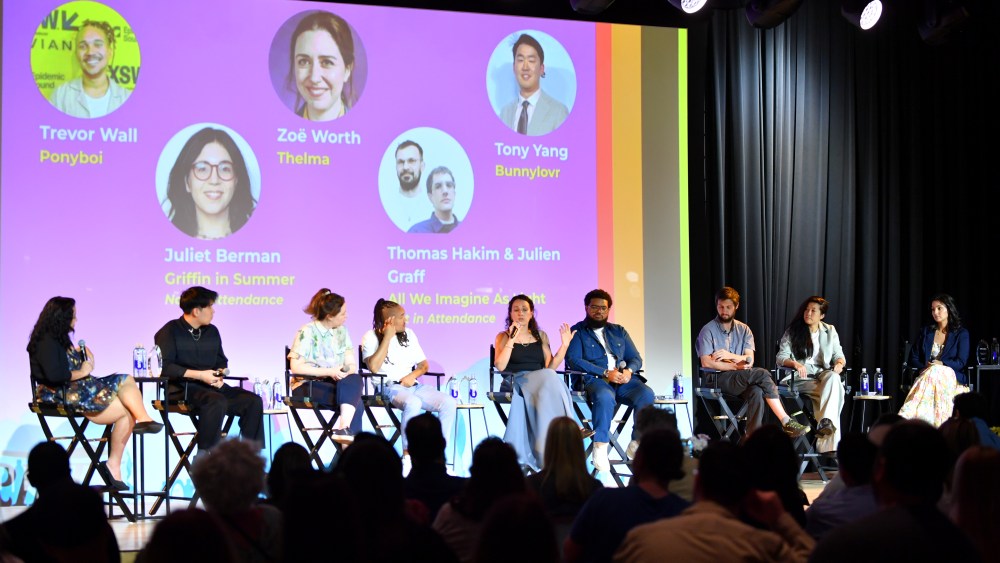Producers Discuss On-Set Challenges at Bentonville Film Festival
Film producers from Variety‘s 10 Producers to Watch List gathered at the Bentonville Film Festival for a panel moderated by Jenelle Riley to share their producing journeys and provide a glimpse into how they tackle different challenges on set.
Trevor Wall (“Ponyboi,” “Slanted”) recalled starting out as an intern at Will Smith’s company on the Sony lot and then transitioning to assistant work and manning the reception. “I distinctly remember the first time Will called, and I panicked because you gotta understand, a Black kid in the 90s, Will was the man, he’s the man. I looked up to him so much, so when I first heard his voice on the phone, I basically panicked and just put him on hold, and when I picked back up, he wasn’t even there anymore,” Wall said.
Jesse Hope (“Rebuilding”) also gave an anecdote about early career stumbles. “My real first job in production was on ‘The Hateful Eight.’ It came and shot near Telluride, and I got hired as Quentin Tarantino’s driver, and I was fired in two days. He accused me of stealing his jacket and I disagreed with him, and then I was fired and ended up doing special effects,” Hope said.
Hope explained why he was fired, and then essentially promoted: “I wasn’t rightfully fired, so they had to find somewhere for me to go because he was just stoned and left his jacket on his bed.”
Zainab Azizi, meanwhile, started off in a mailroom program where she worked her way up to becoming a floater assistant and then navigating various desks before a director identified her producing skills. “I packaged a film for a filmmaker named Sam Raimi, and he was the one that told me, ‘You’re a producer. I’m starting a new company, and I’d like you to run development,’” Azizi said.
The panelists were also asked about navigating unpredictable circumstances, such as last-minute problems or surprising responses to their projects.
For Zoë Worth, who produced “Thelma,” starring June Squibb, there was ageism in some people’s reactions to the script. “We didn’t pitch the movie to studios, but certain agents pitched their clients, I would say, in a very ageist way…We had agents saying, ‘Well, I dunno about June Squibb, but I guess if it were Shirley MacLaine,’ trying to age it down and then therefore age other people down, it was interesting. It’s a movie that feels really silly to do that with, but it still happened.”
Tony Yang (“Rosemead”) discussed a quick solve that arose in the filming of the short film, “Lucky Lu,” which was then adapted into a feature film of the same name. “It’s about a bicycle delivery worker, and he’s delivering all across the city, and our actor wasn’t quite comfortable riding an e-bike because those can really, really go quite fast in the city…So for a lot of those scenes, it’s actually me riding,” Yang said.
In general, a big challenge is working around the budget. “It’s such a hard question because every movie, no matter how much time or quote-unquote money you have, you still don’t have enough. There’s always more movie left at the end of the money,” Stephen Love (“They Cloned Tyrone”) said.
Jessica Choi (“Toy Story 5”) had a story that Riley noted could be its own movie. Discussing an unnamed Netflix film, Choi shared that “we had tried to move an entire movie that was 80% done, animated from a creative animation house in Montreal to the U.S. and we had to send a truckload of five terabyte hard drives over to get the movie loaded on. And then once we got to our new creative house, they got hacked — and it’s over now. We made the movie, it’s out, so I can say it — but you could see on the screen the files being deleted because they had the only backup drive and they were holding it for ransom.”
Fortunately, the movie was still salvageable. “We actually got most of it back. On local computers, we had some copies and then we had to recreate some assets, but it was mostly there,” Choi added.
As these producers continued collaborating with filmmakers, they found that the industry can make it difficult for smaller films to succeed.
“I think distribution’s really hard right now,” Lizzie Shapiro (“The Plague”) said. “I think especially making independent films, it’s just hard to find distributors who really understand how to get to audiences, especially I think a lot of our films up here for more specific audiences that you really need to know how to target, and they’re honestly buying movies for a lot less than we can make them. So the system is a little broken at the moment.”
Yang said the industry could possibly adopt a model similar to the Costco hot dog: “It’s known as a loss leader. It’s $1.50, but it gets everyone into the store and everyone shopping. And I was thinking about it, it’s like if Netflix, Apple and Amazon, they were like, ‘Hey, we’re going to just commit $200 million every year to just make independent films,’ and even if they’re not going to make money, but it generates jobs and it’s like, ‘Hey, instead of spending $200 million on one, just huge blockbuster, you can make 50 independent films with that.’”


